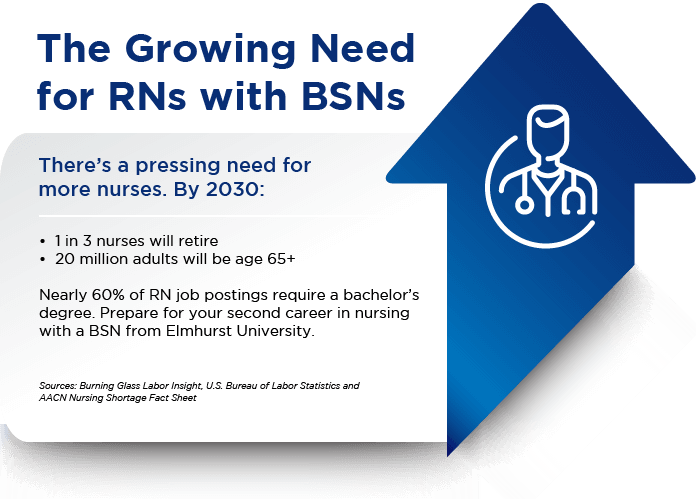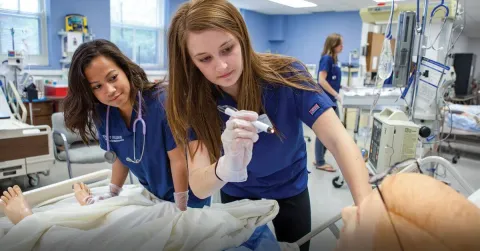- Jump to:
- Curriculum
- Clinical Placement
- FAQs
Launch your second career in nursing
Enrolling in the online Accelerated Bachelor of Science in Nursing (ABSN) program at Elmhurst University is your fast track to building a new and fulfilling career as a registered nurse (RN) from a University that supports you and is grounded in intellectual growth, integrity and social justice.
With your prior bachelor’s degree in any discipline as your foundation, you’ll earn your Bachelor of Science in Nursing (BSN) degree through our online ABSN program in just 16 months. You’ll be fully prepared to take the National Council Licensure Examination (NCLEX-RN) and be well-positioned for your new role providing direct patient care.
Accelerated BSN Program
Use your experience and prior bachelor's degree to earn your BSN online in just 16 months.
Prepared for Success
Elmhurst online ABSN graduates have an 86% NCLEX-RN pass rate (2023).
Academically Strong
Accredited by the CCNE* and ranked by U.S. News & World Report as a leading Midwest university.
Immersive Residency
Gain confidence and skills in simulated scenarios led by faculty in our innovative Simulation Center.
- 2 intakes per year - Fall/Spring
- 2 on-campus residencies & clinical placement support
- 16 months to complete
- 60 credit hours & 450+ clinical hours
ABSN program requirements:
- Bachelor’s degree in any field from a regionally accredited U.S. college or university
- Minimum 3.0 cumulative GPA
- Completion of prerequisite courses with a "C" or better in each and a minimum 2.8 GPA within the science prerequisite courses
To be admitted to the accelerated BSN program, students must:
- Meet certain health requirements and functional abilities;
- Have the demonstrated ability to engage in diverse, complex and specific experiences essential to the acquisition and practice of essential nursing skills and functions; and
- Have the unique combinations of cognitive, affective, psychomotor, physical and social abilities required to satisfactorily perform these skills and functions.
Competitive Look Against Other ABSN Programs
| Benefits | Elmhurst ABSN Online | *Other ABSN Programs |
|---|---|---|
Course Location |
100% Online |
Hybrid |
Program Duration |
16 months |
15 - 16 months |
Total Credit Hours |
60 credit hours |
64 - 66 credit hours |
Tuition Cost |
$50,000 |
$50,900 - $63,380 |
Prerequisite Credit Hours Required |
25 credit hours |
33 - 38 credit hours |
Application Fee |
$0 |
Some Schools Vary |
* In comparison with 5 ABSN programs in Illinois
Online Accelerated BSN Curriculum Sample
-
Focuses on theories, principles and processes for adult populations experiencing common health problems within priority areas of care. Emphasis is on nursing care of the older adult. A systems framework is used to discuss clinical prevention and patient-centered care for select chronic care issues, including end of life. Introduces methods for evidence-based decision-making to support the role of provider of care. The beginnings of leadership skills and ethical practice in promoting optimal care outcomes in acute and community-based systems are fostered. Includes supervised laboratory experiences and clinical practicum.
-
-
-
-
Focuses on theories, principles and processes for adult populations experiencing common health problems within priority areas of care. Emphasis is on nursing care of the older adult. A systems framework is used to discuss clinical prevention and patient-centered care for select chronic care issues, including end of life. Introduces methods for evidence-based decision-making to support the role of provider of care. The beginnings of leadership skills and ethical practice in promoting optimal care outcomes in acute and community-based systems are fostered. Includes supervised laboratory experiences and clinical practicum.
We Manage Your Clinical Placements
Our clinical placement team will work closely with you to ensure your placements meet university and national guidelines. These frequently asked questions will help you better understand the clinical placement services we provide in this accelerated nursing program.
01
What are nursing clinicals?
Hands-on patient care in clinical settings is a requisite component of a nursing degree.
During your clinicals, with the supervision of a licensed RN, you’ll practice what you learned in the online classroom on real patients. During clinical placements, you’ll have the opportunity to work in various settings and experience an assortment of RN jobs and responsibilities, all while developing your core competencies and expanding your skill set.
Clinicals are very similar to an internship or being an apprentice; you provide care for real patients, but you benefit from the supervision and guidance of an experienced RN
02
How does the clinical placement process work?
The clinical placement team identifies and secures quality placement sites and preceptors in your local community. We manage this process for you so that you’ll have time to focus on your coursework and the core competencies you’ll need to succeed and graduate fully prepared.
03
What can I expect during my nursing clinicals?
Your clinical portion of the program will begin after the required clinical clearances, background checks and on-campus residency are successfully completed. Nursing clinicals can require you to work shifts as long as 12 hours. You’ll work under an experienced RN who will coach you throughout the process. During your clinical placements, you’ll gain practical experience by learning assessment skills, care coordination, patient advocacy and much more.
04
How do I prepare for nursing clinicals?
Your placement coordinator will be with you through the entire process by answering your questions, verifying your clearance requirements and walking you through the nursing clinicals checklist. The checklist details the dress code, clinical tools and professional expectations to ensure your success throughout each rotation.
Supporting Our Community Together
In order to help further support our community's health care system, we continue to offer FREE applications to our ABSN and MENP programs.
Is This Accelerated BSN Program Right for Me?
This ABSN program is a rigorous, full-time program requiring 100% of your commitment. It’s strongly advised that you don’t work, even part-time, but exclusively focus on the program for 16 months.
You will use an online learning platform to complete your nursing courses and have direct access to your professors and fellow students. All coursework is done entirely online. Your clinical hours will take place in person, as well as our two on-campus residencies.
The Growing Need for RNs
There’s a growing need for RNs with BSNs. By 2030, one in three nurses will retire and 20 million adults will be age 65 or older, which means their health care needs will increase. In response to these projected changes, nearly 60% of RN job postings now require a bachelor’s degree. Our ABSN program will prepare you for your second career in nursing and ensure you have the skills and experience to meet the health care needs of the future.
Frequently Asked Questions
Below are some of the most frequently asked questions about our online ABSN program. Download your comprehensive digital program guide for more information.
An online ABSN program at Elmhurst University is your fast track to becoming a registered nurse. With your prior bachelor’s degree in any discipline as your foundation, you can earn your Bachelor of Science in Nursing degree in just 16 months. In our online ABSN program, you’ll complete all of your coursework online but gain hands-on experience during two campus residencies and clinical placements. Upon graduation, you will be eligible to sit for the RN licensure exam (NCLEX-RN).
Registered nurses perform a variety of functions in a health care setting. Their primary focus centers on clinical care - ensuring a high quality of patient care whether caring for patients alone or with a doctor. Registered nurses may also perform administrative functions, educate other aspiring health care workers and are frequently involved in policy creation and research projects.
The Accelerated Bachelor of Science in Nursing program at Elmhurst University can be completed in 16 months.
Our online ABSN program offers two start dates per year. Classes start in August for the Fall term and January for the Spring term.
Yes, this accelerated online BSN program is accredited by the Commission on Collegiate Nursing Education (CCNE),* and the university is accredited by the Higher Learning Commission (HLC).
No. All coursework is 100% online, but clinical placements take place at health care sites as close as possible to your local area and the two on-campus residencies are held at Elmhurst University. This rigorous program is a full-time commitment that is not self-paced; some courses include live sessions via Zoom.
No, we strongly discourage students from working while in the program. ABSN students may spend 8 to 12 hours a day studying and completing clinical hours. It is best to give this accelerated program 100% of your focus to ensure you are well-prepared to take the NCLEX-RN and become a nurse upon graduating from the program.
Yes, you may apply to the program without having completed all prerequisites, but you will need to show successful completion of the prerequisites prior to enrolling in the program. An enrollment advisor can help you identify local and online options for satisfying this requirement.
You will need 25 credit hours of prerequisites courses, and you must have earned a "C" or better in each and a 2.8 GPA within the science prerequisite courses:
- Anatomy and Physiology I (4 credits)
- Anatomy and Physiology II (4 credits)
- Microbiology with Lab (4 credits)
- Statistics (3 credits)
- General Chemistry with Lab (4 credits)
- Lifespan Psychology (3 credits)
- Abnormal Psychology (3 credits)
If you’re concerned about paying for your education, you’re not alone. Your enrollment advisor can help you navigate the financial options that are available.
We encourage you to first schedule an appointment with an enrollment advisor to discuss the program and your goals. When you are ready to apply, please have all official transcripts sent to our online records team to ensure the quickest processing possible. They may be sent either electronically or via mail.
If sending electronic transcripts, send to admissionsrecords@onlinedegrees.elmhurst.edu. Please confirm this receiving address when ordering, as many sending institutions have default email addresses in their ordering systems. If sent to an alternate email address, it could create a delay in processing the application.
If sending transcripts via mail, send to the address below. Please confirm this receiving address when ordering, as many sending institutions have default addresses in their ordering systems. If sent to an alternate address or office, it could delay the processing of the application.
Elmhurst University
Online Records Processing
1501 Woodfield Rd
Suite 204N
Schaumburg, IL 60173
For any questions, please reach out to your enrollment advisor.
You can find more information and start your application on our Apply Now page. To learn more about the program and get answers to your questions, schedule an appointment with an enrollment advisor.
Recent Blog Articles
How to Become a Nurse
Fast-track nursing degree options are more popular than ever – students have the option to shift to this rewarding and crucial career in only a few years. Looking to make a difference in your community? Your journey to a meaningful, secure, and rewarding future starts here.
7 Things to Consider When Getting a Nursing Degree Online
Due to the sheer number of programs available online, choosing an online nursing school can seem daunting. Read for some simple considerations to keep in mind when choosing where you’ll get your nursing degree online.
9 Jobs for Nurses Outside the Hospital
Interested in what careers look like for nurses in nontraditional environments? Explore 9 jobs for nurses outside the hospital and consider a new career.
Learn More
Meet the Faculty
The professional and committed nursing faculty will teach, mentor and support you throughout this rigorous program.
Clinical Placement
What are clinicals and how does clinical placement work? Our clinical placement services team will answer your questions.
Residency Experience
Elmhurst’s campus residency will guide your nursing skills development in realistic health care settings, prior to your clinicals.
Tuition
Learn about tuition, fees and financial aid options.
Read More about tuition and financial aid









